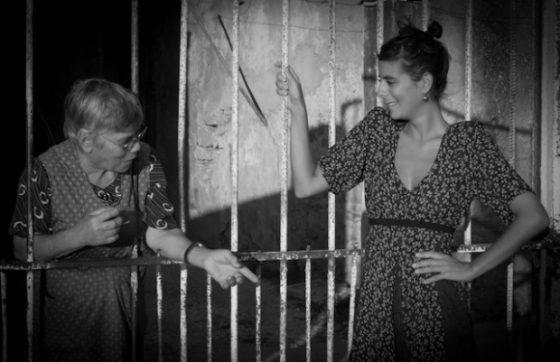Blogwatching: Amsterdive – The good old language struggle

Ana V. Martins is a Portuguese actress and a writer who lives in Amsterdam. Her blog, AmsterDive, is about her relationship with Amsterdam with a focus on arts and culture. In this post, she writes about a common problem among many internationals – losing her native language.
Yesterday I was thinking of the downs of living ‘abroad’. I must say I very rarely ask myself this question, but I know that this is a very relatable topic to most expats. If you are one, you might immediately have a whole spectrum of ideas on it. Things like the absence of friends and family might automatically pop into your mind, or the missing of certain foods, your hometown, the weather, or a type of human warmth very specific to where you come from. Personally, the following sentence immediately banged in my head:
Will I ever get used to making mistakes in almost every single sentence, or group of sentences I articulate?
The biggest challenge I face as an expat is the fact that I am not able to express myself the way I could back in Portugal. When confronted with limitations, one becomes especially aware of how it feels not to have them. And it seems like a miracle to me now how one’s native language flows within. How you effortlessly communicate what you want in your language, the way you want, without giving it much conscious thought.
Don’t get me wrong, my level of English is advanced and I speak fluent Dutch, but somehow I’m never satisfied with my proficiency level in either of them. First of all, my skills in the Portuguese language set a very very high bar in any other language I attempt to learn or improve.
Second, most of my creative work is in English. I write, and mostly perform in English, and having to confront myself with a certain degree of language restriction is probably my biggest of daily frustrations.
The notion of ‘being abroad’ is for me – I came to realize -, directly related to language. A language is an undefinable place: it does give you some sense of direction, but it doesn’t necessarily correspond to a physical location. It does correspond to a sense of intimacy, instead.
Precious
Now, I don’t have a very strong bond with my country of birth when compared to other fellow expats, but my native lexicon, Portuguese, used to be my precious (Smaug style). My self-esteem used to depend on my communication skills.
The way in which I could put myself and my inner world into words was the measure of my own worth. I guess I still work like that, and that’s why I made myself learn Dutch, as fast as I was able to. I just couldn’t stand the fact that I didn’t fully grasp the world around me, that I couldn’t navigate it. I refused to be ‘imprisoned outside’.
Living abroad, I had to get used to expressing myself differently from the way I would, back home. And at first, it didn’t really matter. I was busy meeting people, happily absorbing whole new cultures around me, reinventing myself, surviving. What’s more, I love languages. When I had my first Portuguese friend visiting me in Amsterdam, I remember asking him to just keep on speaking English to me (imagine that). This, of course, doesn’t happen anymore, but that’s how committed I was to my life abroad.
Creativity
The beginner’s adrenaline made me, for the longest time, divert from a deeper loss: language allowed me to live creatively on a verbal level. Not anymore, or at least not in the standards I was used to. Back in Portugal, I could say exactly what I felt – in a regular way, or with more refinement, or in poetic fashion, or intentionally in a rough way – depending on the situation. I could surprise others with certain words or expressions, I could, more often, make people laugh. It allowed me for a sort of playfulness which, in return, made me feel smart.
In a way, words are the matter from which we are made: it is through them that we perceive, reflect, and interact with the world around us. Through them we create. Through them we are. My native language was more than a sense of identity. It meant freedom. Just now, after 5.5 years living in The Netherlands, I feel that I have a full understanding of this.
So there’s this little part of me which is mourning. And that’s okay. I feel happier living abroad than I did when living in Portugal, so this is a consequence of a very conscious decision of mine. But there’s one thing I have to tell you: now when I go on my once-a-year holiday to Portugal, my favorite activity isn’t lying on the beach anymore, nor swimming in the ocean, nor eating pastéis de nata.
My absolute favourite thing is speaking with people. Chatting, making small talk: in the lift, in a shop, on the streets, basically everywhere. This verbal connection which fills me with joy, right from the gut, is incomparable to anything else. And you know what’s beautiful in all this? The Portuguese language will always remain this happy cherished zone deep within me, a solace which I can always resort to.
You can read the original post on AmsterDive.
Every month we feature a blog post from one of our bloggers. Interested? See if your blog meets the criteria to be included on the site.
Thank you for donating to DutchNews.nl.
We could not provide the Dutch News service, and keep it free of charge, without the generous support of our readers. Your donations allow us to report on issues you tell us matter, and provide you with a summary of the most important Dutch news each day.
Make a donation